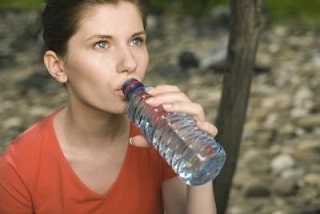 The human body is made up of about 70% water, and it is important to maintain this level of hydration as the water is needed by every single cell in the body for it to function optimally. One of the problems that not drinking water regularly can lead to is dehydration, which comes with an entire range of complications.
The human body is made up of about 70% water, and it is important to maintain this level of hydration as the water is needed by every single cell in the body for it to function optimally. One of the problems that not drinking water regularly can lead to is dehydration, which comes with an entire range of complications.
Dehydration can lead to a dry mouth, thirst, cramps, exhaustion, heatstroke, cerebral oedema, seizures, kidney failure, coma and even death. It can also lead to hyperglycaemia, which is an abnormally high blood sugar usually associated with diabetes. Chronic hyperglycaemia is most commonly referred to as type 2 diabetes.
Causes of Hyperglycaemia
Dr. Lise Bankir and her team from the French National Institute, INSERM, have found a correlation between water intake and blood sugar levels. According to their research, they believe that a hormone called vasopressin, which is an antidiuretic that helps to regulate water-retention in the body may be the missing link. Vasopressin levels rise when we are dehydrated, causing the kidneys to conserve water, but at the same time, vasopressin receptors in the liver produce glucose, causing elevated blood sugar levels.
The study was run over a period of nine years, on 3,615 French adults between the ages of 30 and 65 with normal blood sugar levels. Approximately 19% of the group drank less than half a litre of water per day, and the remainder drank a litre or more. During the duration of the study, approximately 565 participants developed unnaturally high blood sugar; 202 participants developed type-2 diabetes. Those who drank a litre or more water per day were 28% less likely to develop a high blood sugar count than those who drank less.
Bankir stressed that although the study was unable to take general eating habits into account, it did account for alcoholic and sugary drinks, exercise levels, and body-weight. Although the study could not prove the correlation between water intake and hyperglycaemia, Bankir is sure that they are on the right track and that a larger study would detect a statistically significant link.
James R Gavin III, MD, PhD, clinical professor of medicine at Emory University School of Medicine in Atlanta says that not drinking water regularly in sufficient quantities could be similar to what is seen in people who consume a lot of cholesterol; too much fat and cholesterol in the diet may make some people more susceptible to type 2 diabetes, and so an insufficient fluid intake may also influence an individual’s susceptibility to diabetes.
It is recommended that everyone drinks water often and ensure that they drink sufficient water to keep their body hydrated at all times, adjusting the amount of water that they drink according to personal circumstances such as weight, exercise, and weather.
Diabetics must ensure that they have immediate access to drinking water at all times, as they must drink sufficient fluids to meet their water needs and replace all water lost due to sweating or urination. Diabetics will urinate more often due to their kidneys upping production of urine to eliminate blood sugar. If the balance of fluids in a diabetic gets too out of whack, it can cause them to fall into a diabetic coma, which is very dangerous.
An easy way to ensure that you always have cool, refreshing water to drink if you are a diabetic is to purchase a water cooler for you home and convince your boss to get an office water cooler too. Being able to drink water whenever you need to is a boon, and the fact that the water is chilled and tastes great to boot is a bonus.
Rent water dispensers and mains fed water coolers from Living-Water.
Source:





